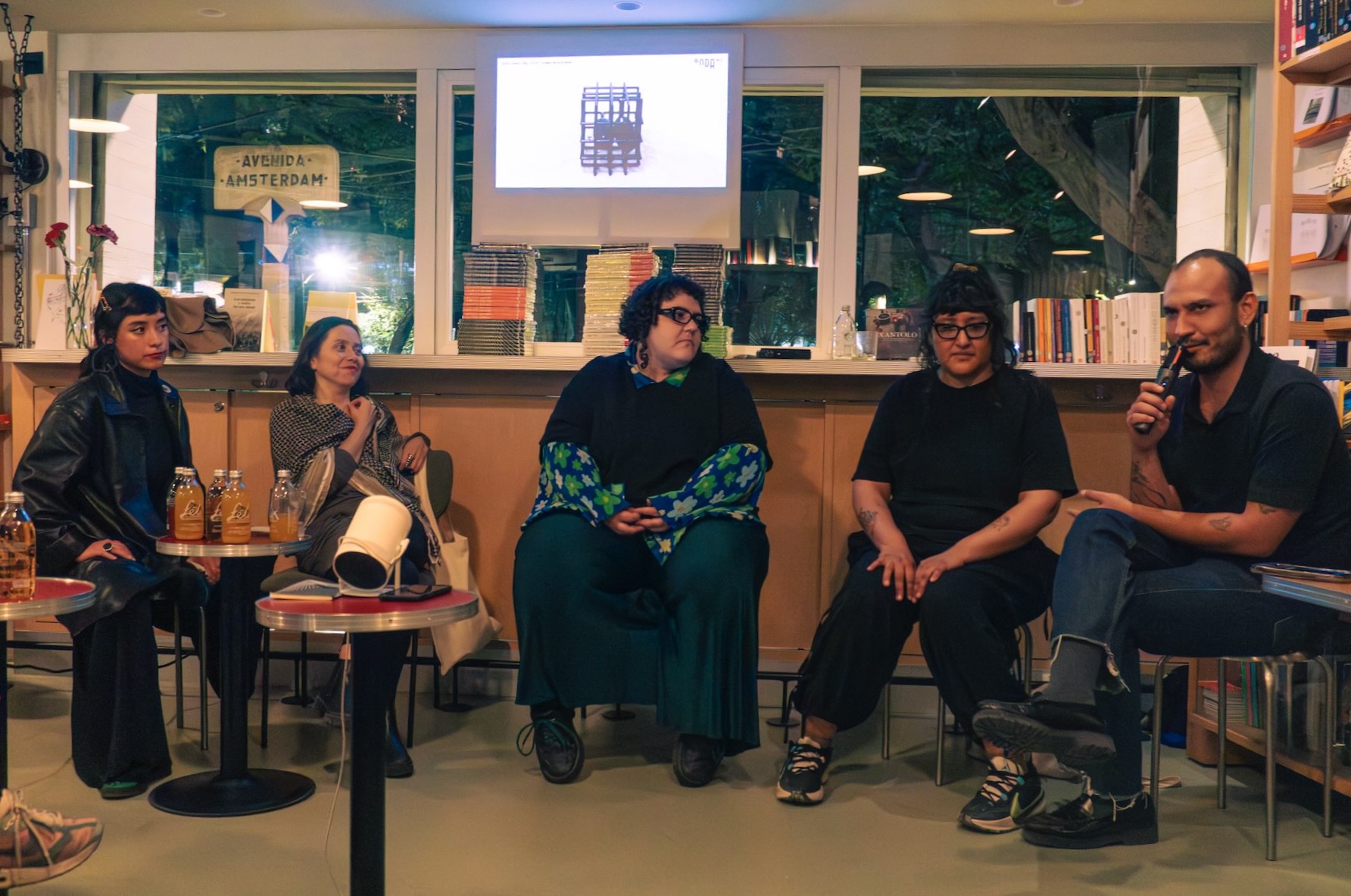
Article
y que le digo y que me dice: Bodies in Resistance. Summary of our 2nd talk
by Sandra Sánchez & Josephine Dorr
Reading time
5 min
On October 22, 2025, the second session of y que le digo y que me dice took place at La Americana Bookstore in Mexico City, organized by Onda MX. This initiative arose from the need to create a space for dialogue among artists, writers, and other thinkers around the themes that traverse contemporary artistic practices in Mexico. Drawing from recurring symptoms we have observed in artworks and texts published in our digital magazine, the goal is to foster an exchange of ideas, sensations, and intuitions with—and from—the community.
The second conversation, Corporalidades en resistencia [Bodies in Resistance], brought together artists, researchers, and curators Stefanía Acevedo, Helena Chávez Mac Gregor, Octavio Gómez Rivero, and Lucía R., moderated by Sandra Sánchez, editor of Onda MX. We chose to address this topic because, over the last decade, there has been a growing interest in breaking down the mind–body binary, approaching corporeality from narratives critical of heteropatriarchy, and situating the body as something not exclusive to the human—opening it instead to interspecies narratives.
We invite you to watch the recording of Corporalidades en resistencia, where the following themes were explored:
● Experience as the starting point for the invention of one’s own body.
● Curatorial practice as a critical methodology to make visible current issues and their reception by diverse audiences, with reference to Teoría del Color (MUAC, 2014) and Maternar(MUAC, 2021).
● The archive as a political site that opens the possibility of telling our own stories.
● The circulation of desires and materials among human, nonhuman, natural, and technological bodies.
● The diverse ethics practiced in the representation of corporealities.
● The untenable distinction between the body we are and the territory we inhabit, from the Mexican context.
● Erotic practices as mobilizing forces and their confrontation with other forms of alterity.
This series of talks, organized by Sandra Sánchez and Josephine Dorr, will take place between 2025 and 2026 in three cities: Guadalajara, Mexico City, and Monterrey.
Speakers in Talk #2:
Stefanía Acevedo holds a BA in Philosophy from UNAM, an MA in Communication and Politics from UAM–Xochimilco, and both a Specialization and Master’s in Psychoanalysis from Dimensión Psicoanalítica. She is currently pursuing a PhD in Philosophy at UNAM. She has taught various courses on art and philosophy at the Faculty of Philosophy and Literature (UNAM) and is the author of El hacktivismo y la cuestión de la técnica (2020). She collaborates with the Cooperativa Cráter Invertido and Radio Tropiezo, with whom she participated in documenta 15 (Germany) as part of the translocal network Arts Collaboratory. Since 2017, she has been involved in collectives interested in autonomy, free media, and collaborative work. She is also a contributor to Onda MX.
Helena Chávez Mac Gregor is a researcher at UNAM’s Institute of Aesthetic Research and holds a PhD in Philosophy from the same university. From 2009 to 2013, she served as Academic Curator at MUAC, where she developed the Critical Theory program Campus Expandido. She currently teaches in UNAM’s graduate program in Art History. In 2018, she received the “Reconocimiento Universidad Nacional” award for her contributions to art education. Her recent curatorial projects include El tiempo se siente menos si nos quedamos quietos. Melanie Smith (MAZ, 2025), and, with Alejandra Labastida, Maternar. Entre el síndrome de Estocolmo y los actos de producción (MUAC, 2021–2022). Her latest book, El listón y la bomba. El arte de Frida Kahlo, was published in 2025 by Lumen/Penguin Random House.
Octavio Gómez Rivero, of anarchist and heterodox formation, develops essays that seek to construct a philosophical an-archaeology across fields such as literary studies, the history of technologies, theoretical ethnography, cybernetics, and contemporary art. His current research explores experimental uses and immersive interdependencies within baroque cosmotechnics. He produces works as part of the duo BABA and is a member of the art collectives EVA and C.R.N.0.
Lucía R is an artist and researcher whose practice explores the networks of relations among human, nonhuman, and more-than-human bodies from a political-affective dimension. Working with materials such as clay, technological waste, and minerals—understood as agentive bodies—her works become sculptures, installations, or sound pieces that question hegemonic binaries. Since 2024, she has been developing Litemia, an artistic research project around lithium as an element that permeates devices, psychopharmaceuticals, bodies, and territories. She continues this project as part of the PhD in Visual Arts at UNAM and the SOMA Studies program. She is co-curator of Murmuro, a sound art and listening gathering, and teaches at Universidad Iberoamericana.
Sandra Sánchez is an artist, curator, writer, and editor. Her practice centers on the practical possibilities of art, collaboration, and listening as critical interventions into the sensorial logics of neoliberalism. She is part of El Cuarto de los Ojos Sucios (a performative space dedicated to the mediation, exhibition, and critical reflection on contemporary painting), Máquina Simple (an editorial research group), Círculo contra el soundscape (a sound research collective), and Ambient para leer (public installations exploring the intersections between sound, reading, rest, listening, and contemporary art). She is editor of Onda MX magazine and teaches at Universidad del Claustro de Sor Juana.
Translated to English by Luis Sokol
Published on October 31 2025